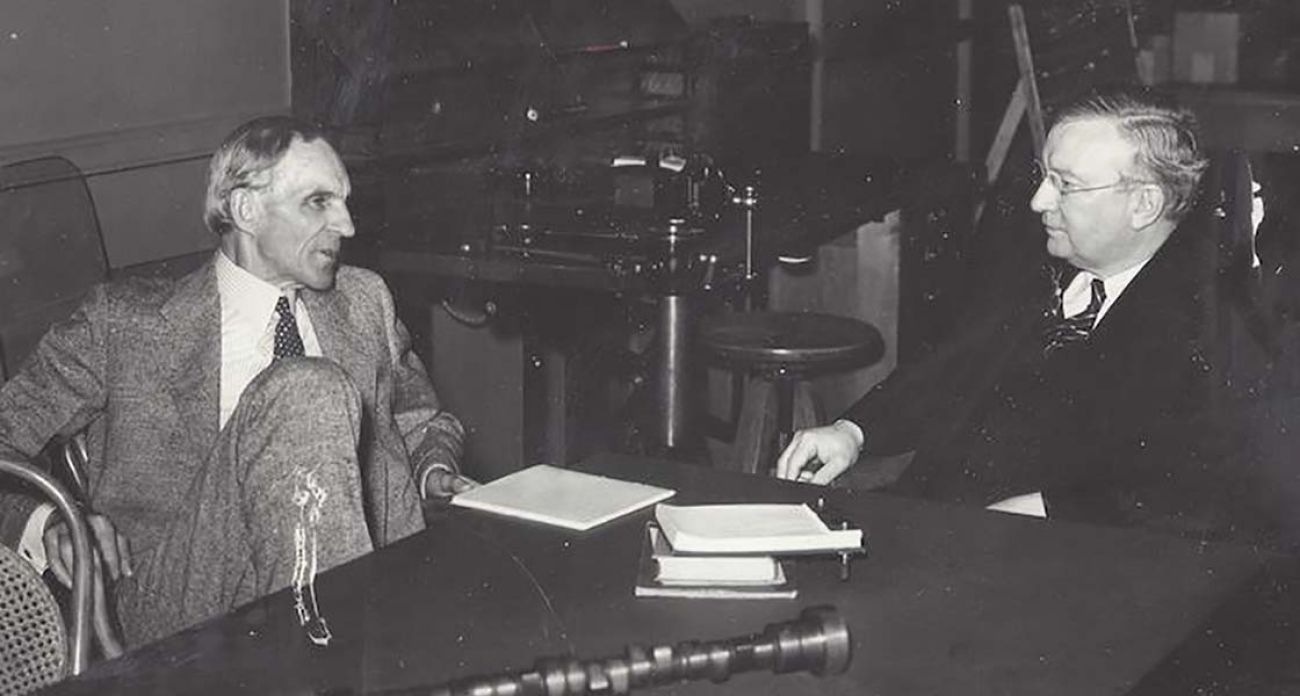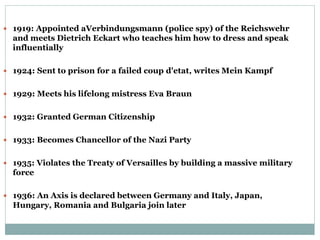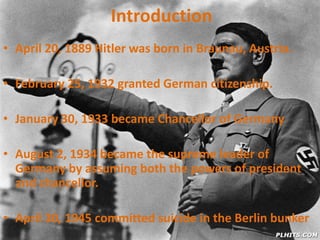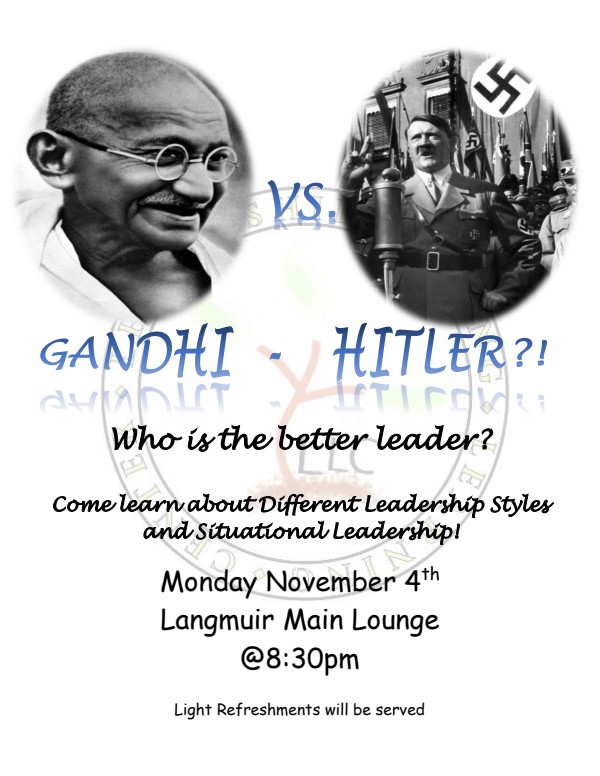Adolf Hitler was a German politician and leader of the Nazi Party. He rose to power as Chancellor of Germany in 1933 and later Führer in 1934. During his dictatorship from 1933 to 1945, he initiated World War II in Europe by invading Poland in September 1939. He was closely involved in military operations throughout the war and was central to the perpetration of the Holocaust.
Hitler's leadership style can be described as authoritarian and charismatic. He was a strong and decisive leader who demanded absolute loyalty from his followers. He believed in the concept of the "Führerprinzip," or the "leadership principle," which held that the leader's will should be supreme and that all decisions should flow down from the top.
One of Hitler's key tactics for maintaining control was to use propaganda and manipulation to shape the beliefs and behaviors of the German people. He used his powerful oratory skills and the Nazi Party's extensive propaganda machine to present himself as a strong and decisive leader who would restore Germany's national pride and greatness. He also used propaganda to demonize and marginalize groups such as Jews, homosexuals, and political dissidents, which helped to create an atmosphere of fear and conformity among the German population.
Hitler was also known for his ruthless tactics and his willingness to use violence and intimidation to achieve his goals. He was responsible for the deaths of millions of people during the Holocaust and World War II, and he was willing to do whatever it took to achieve his vision of a "new order" in Europe.
Despite his authoritarian and violent leadership style, Hitler was able to maintain a strong level of support among many Germans. He was able to tap into the widespread discontent and frustration that existed in Germany after World War I, and he was able to present himself as a solution to the country's problems. He also used his charisma and propaganda skills to create a sense of unity and purpose among his followers.
In conclusion, Hitler's leadership style was authoritarian, charismatic, and ruthless. He used propaganda and manipulation to shape the beliefs and behaviors of the German people and was willing to use violence and intimidation to achieve his goals. Despite his many atrocities, he was able to maintain a strong level of support among many Germans due to his ability to tap into the widespread discontent and frustration that existed in the country at the time.
Adolf Hitler's Controversial Leaders

His words could appeal to the subconscious and irrational part of the public that made him a formidable politician of his time. His ability to remember precise details such as historical information, personal experience, facts, and economic statistics made him a good military leader. It is no great secret that as a dictator he will go down as one of the most infamous political faces the world has ever seen. At the age of eight, together with his parents, the boy moved to such a place in Indiana, where there was no school nearby at all. It can be argued that he chose a more transactional leadership style focused on systemic acquisition of power and ensuing control over Germany and Europe. Hitler also had a misinterpretation about air superiority, thinking that air superiority was not necessary until forces were being overpowered Overy 1980 pp.
Adolf Hitler: The Leadership according to the time

He managed to remove all obstacles from his path, including the President of Germany and the Reichstag, and become an unlimited dictator. During the rise to power of the Nazi party members went to extremes to ensure the eventual success of its power grab using murder, coercion, and propaganda. His secretaries never became maddened by any kind of rudeness or lack of indulgence towards them. He was a master at public speaking and a propaganda artist. This often means a high level of emotional intelligence. After that, Hitler became the utmost leader in Germany, and the dictatorship primarily characterized his leadership.
Hitler and Churchill: Comparison of Leadership Styles

He used coercion as an influence tactics. As a military leader, he had all the qualities such as strong will power, intelligence, and nerves of steel. This factor defiantly helped Hitler in his rise to power because his personality is who he is, his stubbornness and arrogance defiantly helped him become one of the most listened to men in Germany. It means that his decision was the final one and no decision during the war was made without his direct involvement Braunbeck, 1997. The words of John Maxwell are a true reflection of the common perception and expectation of a leader from the society.
Leadership Style and Traits of Adolf Hitler

He felt they needed to take a stand and be restored to its former glory which he achieved in many respects, they were the driving force in Europe during the war. However, their beliefs and values were radically different, which significantly affected the results of their activities. Abstract The human qualities of a leader are in many ways more revealing regarding his or her success, the respect of the people, and the appreciation of descendants than education and professionalism. Through a series of political plays, he was appointed Chancellor by the government in January 1933. His intelligence can be seen through the various approaches that he used to gain the Germans on his side. He was walking from side to side at the stage and he was gesturing with his hands and the tone of his voice was loud and passionate.
Hitler: Leadership Analysis

All Answers ltd, 'Biography And Leadership Styles Of Adolf Hitler History Essay' UKEssays. He knew personal details for them, fact which shows that he was interested in them and in their personal psychological health. People were most willing to follow him because he seemed to have the right answers in a time of enormous economic upheaval. Storytelling is inherently manipulative rather than motivational as it creates a clear and rehearsed public image and thematic ideology, but many factors are fragmented or hidden from public discourse, resulting in disinformation. This man would be one of the most unrelenting dictators of the century, causing the bloodiest war in history, causing almost seventy-three million deaths. Get Help With Your Essay If you need assistance with writing your essay, our professional essay writing service is here to help! Because he was born in a farming family with poor income, Abraham could not get a full education, went to school no more than a year, and joined the physical work from an early age. People were too afraid of the dictator and his powers to do something about his gruesome actions.
What were Hitler's leadership styles?

It is easy to think that Hitler is a leader with transformative leadership. All these critical qualities help to make the necessary decision in certain critical cases; sometimes he can even take risks because in certain critical situations his determination and courage are increased. Likewise, legitimacy is must-have essence in a national leader it is obtained through the support of the public. Hitler was very task driven and had clear goals in mind, and would do just about anything to achieve them. In each book, we study 10 influential leaders in Business, Military, Politics and Sports. The economical, social, and political standpoints in Germany at the time were a disaster.






